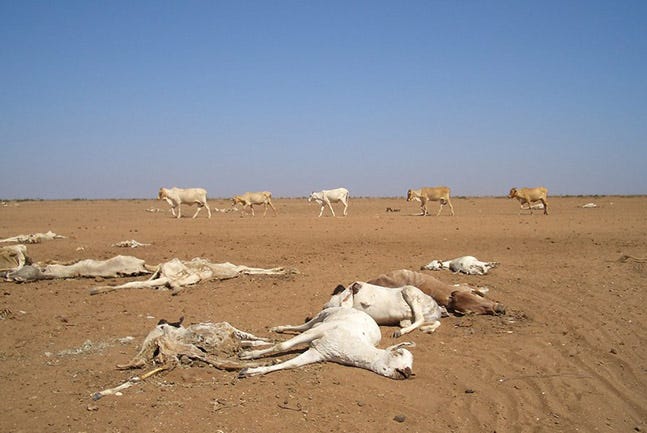What a pleasant October we’re having, don’t you think?
I mean, it’s great for us as we can walk through a pleasant autumn and enjoy the beautiful scenery around us but it’s all very telling about the state of the environment.
We don’t necessary feel the effect of climate change on a day-to-day. Most of us reading this newsletter probably live comfortably and natural disasters (thankfully) aren’t common in the UK. However, it certainly isn’t the same in the rest of the world.
Climate change is real and this time the global climate change conference, COP27, will be held in Egypt. The effects of climate change are disastrous in the developing world and here are some examples:
The number of droughts have tripped between 1970-79 and 2010-19 in sub-Saharan Africa.
West and central Africa saw some of the biggest population displacement in history due to flooding causing loss of shelter and cultivated land.
Changes in ecology has led to the increase in diseases including malaria, dengue fever and Lyme disease throughout Africa.
As healthcare professions, we are largely concerned about health and wellbeing so it’s important to evaluate the impact of these environmental changes on health.
Rising sea levels reduce water quality, leading to severe bouts of diarrhoea causing mortality.
Loss of cultivated lands have led to food scarcity and malnutrition, causing 1.7 million deaths in Africa.
According to the UN, malnutrition has increased by almost 50% in Africa since 2012 with a steep increase in mental health crises.
Why is this important? Climate change is a global issue requiring global action. It is unfortunate that Africa as a continent has suffered so greatly due to climate change as it has probably contributed the least to climate change. North America and Europe have contributed 62% of CO2 emissions since the Industrial Revolution whilst Africa has contributed only 3%.
Climate change is leading to poor health outcome. Rising global temperatures has affected the quality and availability of food, caused the destruction of entire ecological systems and resulted in the flourishing of infections which would otherwise be at bay.
I feel that knowing these facts is vital for us and we should hopefully take it upon ourselves to be advocates for climate education and take our own steps to protect our environment.
FREE Respiratory Webinar
After the success of our last webinar, we have decided to run another Pareto Principles webinar this time covering respiratory medicine. Once again, we will be covering the main principles of respiratory medicine including tricky subjects like ABGs and chest X-rays. On a final note - we are now CPD accredited and will provide certificates if required.
Log onto our website and sign up now!
Check us out on our various pages
Website: www.paretoeducation.co.uk
Instagram: www.instagram.com/pareto_ed
Twitter: www.twitter.com/pareto_ed
Youtube: https://bit.ly/3DPm23c
Email: paretopaeducation@gmail.com






